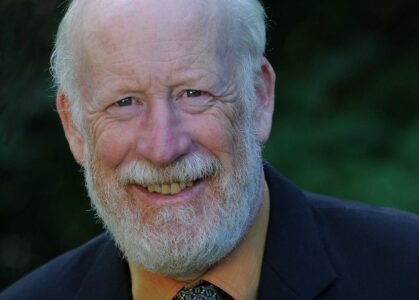Education, History and Culture: Who Benefits? Who Leads?
“Education should form the Character.” — John Dewey
“When The People are taught what is best, then they can rule themselves.”
— Thomas Paine
By Charles Jeanes
Good lessons make good people
If there is one thing that characterizes the passage from a medieval Christian view of humanity to a modern secular one, it is the changed idea of how much humans can be “perfected.” Christian social teaching in The Middle Ages had low expectations for people to be improved, because since The Fall of Adam and Eve in the Garden, human nature was depraved and doomed to sin, as St. Augustine taught. The modern notion of the human being was less dismal; in Shakespeare’s great soliloquy written for Hamlet, we see a new vision dawning:
What a piece of work is Man! How noble in reason, how infinite in faculty! In form and moving how express and admirable! In action how like an Angel! In apprehension how like a god! The beauty of the world! The paragon of animals!
From this point of view, we humans can be improved. Thenceforth, God and Satan were no longer at war for our souls; now the struggle would be over who and what would shape our minds, hearts, consciences, and characters. Since we can be better, someone has to take responsibility for the curriculum of our learning. The concept of engineering people in the mass, in society, is born.
In this new perspective of humanity, people appear malleable to social engineering. This is my topic: what we should be taught from History. We can be better people if only we learn the right kind of history…
Basic social political lessons
Canadians do not think about politics as a matter of social classes competing for power in the State, wanting to use the State’s machinery for policies favourable more to one class than another class. I understand politics as exactly that. Politics is about ideas, yes, but action matters most.
I believe that there is a ruling class which has fundamental control over the State. This small class ensures it rules by rendering the large majority of us unable to think clearly about this truth — the truth that we are ruled by a small minority of the few who own enormous property, material wealth, and capital in the form of money. It is not just One Percenters, but less than 10%.
We all talk now as if all Canadians understand free market capitalism. But we do not grasp that there is a ruling class; it is a quite small number of extremely powerful capitalists who set the rules of who prospers and how. One does not find this explained in newspapers or other media, and rarely in schools either.
We feel free in important ways, to fight for “rights” and put our ideas in policies. Policies become legislation, become law, and impact our lives.
Within the broad boundaries of who is the ruling class and who are affluent servant classes for the ruling few, there is plenty of latitude for the servants to have quite high incomes. But income does not move one into the ruling class.
The middle class has apparent freedom for cultural practices, including all the people in arts and professional occupations. Education is a vast industry employing millions of people, most of whom accept as truth that what is taught to students in schools and universities is a matter of policy set by government. But since we do not perceive government as an instrument operated by a ruling class we do not see education policies as serving ruling-class needs.
In the beginning…
Readers need not read any further if these basics of my world view are unacceptable. What follows in what I say about education and curriculum is founded on accepting that the people who choose educational policy for our institutions of learning are serving the ruling class, not free to teach whatever seems good to them to teach; what is “good” to teach is not determined by straightforward argument about “the best things a human being can learn.”
What we are presented as choices for study are never open choices. There is a purpose behind the things we are offered for study. The purposes are in harmony with the continued rule of the ruling class. It is never in their interest to broadcast and popularize an education that would motivate and energize the masses of people to fundamentally transform the systems we endure.
What do we need to know to be “happy”? That might seem to be the starting question for discussion of what should be taught in our institutions of education. We then get into questions of happiness, and the pursuit thereof, and find that the topic can expand out of manageable bounds.
So I propose not to be drawn deeply into the matter of happiness. Even that concept can be manipulated by the minority of the population who rule us and teach us. I hope it will suffice to say, in a civilization of scientific, secular materialism, that securing and owning things, and experiences of pleasure, are the building blocks of happiness as we normally understand the concept.
What education materially assists a human toward maximum happiness?
I will narrow the topic of what to teach to one field of human activity, History, the subject I have taught professionally. (Yes, as an educator drawing pay from the State, I have been a member of the servant class of professionals I refer to above, the medical professionals, the engineers, technicians, scientists, lawyers, members of government and legal bureaucracies, artists, media workers, and so forth.)
I am asking, why is some history taught and some not taught, and how is the manner of teaching history affected by the needs of the ruling class to promote social harmony and acceptance of the continued rule of their systems of economy, politics, law, and ideology.
Knowledge of the Past, Skills for ruling in the Present
Where to start learning human history? That is the question. With the Greeks, of course. Why? because our tradition long ago decreed Greek civilization as one of the two great taproots of the West. (The other taproot is our “Judeo-Christian” biblical religious system of values.) And the Greeks invented the study of History as we understand that word today.
The Greeks themselves began the prejudice against cultural practices from The East, since their elite classes regarded Asia and Europe as foreign, barbarian lands and less worthy of study than Greek matters. Read Thucydides, the Athenian master of writing history, for an account of how Pericles compared Athens’ excellence with foreign places. Pericles could speak the same words today in Parliament – substituting “Canada” for “Athens” in his oration — and be warmly cheered by the government of Stephen Harper, the P.M. foremost.
Rome conquered the known world, leaving only Persia, India, and Germania outside its bounds – Roman ignorance of how vast the world is left their elite feeling smug about imperial reach. Rome’s elite adopted the Greek view of superiority of their civilization, and a well-educated Roman patrician in posts of great power over thousands of subject people knew a great deal about Greek and Roman history and culture and very little of other people.
Teachers of aristocrats were Greeks or Romans; Rome’s ruling class knew what was necessary to govern the subjugated with codified legal administration, ferociously-effective military methods, and efficient means for extracting wealth by taxes and tribute. The education of a ruling class meant Greek and Roman history was absorbed with maximum pride in their heroes and victories, arts, sciences and philosophies. The Empire lasted a long time; one can conclude that the ruling class was receiving an adequate education in history to enable it to exercise its power effectively.
Loss of classicism, medieval darkness, clerical educators: 400 to 1400
With Rome eliminated from northern and western Europe as an empire after about 450 CE, the new civilization of half-Romanized Germanic and Celtic Christians had to develop an education system apt to the need of a ruling class of warriors, kings, and Church hierarchs. Christendom, ruled in its Catholic Church by the Roman papacy and in kingdoms by nobility and monarchy, was not much like Rome’s empire. But the same basic need for the ruling class to educate its members in history was just as real for medieval men as for the Romans and Greeks before them. One magnificent new book, a foundation for this Western civilization (as Homer’s Iliad and Odyssey were basic to Greece) was added to the canon of Christendom: the Bible. Here is where the other taproot of the West, the Israelite/Hebrew/Semite tradition, enters our soil.
Kings and lords of England, France, Germany, Spain and Italy – the five great centers for Christendom – cared little for Greco-Roman history in the middle ages. No one knew the history and no one thought it very valuable to study. The ruling class came to care a lot about Bible stories taught to them by clergy of the Church: David and Goliath, Abraham, Moses, Jesus and his Saints, were absolutely the stuff of an education for a ruling-class man of medieval Europe. Of equal weight were tales of secular heroes like Alexander, Ragnar, Theudrich, Charlemagne, Arthur, and Sigurd, famed not for doing godly things but for mighty feats of war. A warrior must study paradigms, models of heroism.
The clergy taught the biblical tradition, the minstrels and epic singers taught the warrior ethic, and this was the education in history for the ruling class.
Who made the decision about what to teach? the clergy, obedient to the pope and his officers, and the kings and lords who patronized the men who knew vernacular tales, poems and legends. There was no middle class of men whose livelihood was to be secular educators first and foremost.
Renaissance Synthesis: Greco-Roman and Christian educations merge: 1400 to 1600
After about a thousand years of medievalism, the classical heritage of the West emerged in The Renaissance, first in Italy, then France and other centers of Christendom, from about 1400 CE through to the era of Shakespeare.
From my introduction, readers will appreciate that a Renaissance perspective on humanity and the human condition was unlike a medieval Christian one. The idea that education might improve humans was a startling insight for educators. Brilliant ideologies were generated in a newly-literate era when the invention of printing presses and books allowed a much wider audience and when a middling class of “bourgeoisie” – urban, non-noble, materially-secure, mercantile – came to be a market for a culture that was not just for the ruling class. The aristocracy still ruled Europe, but the bourgeoisie produced culture.
Renaissance intellectuals promoted humanism, the central fact of which is a higher opinion of humanity than Christian ideology had entertained. The Humanist loved classicism, the ancient Greco-Roman way of life. The Renaissance adored the classical age, and naturally the writing of great Greeks and Romans, many rediscovered and translated for the first time since the Dark Ages, were the best-selling books of their day after the Bible.
Education for a Christian Prince became a topic for men who thought about education as a profession. Rulers could not just know about the heroes of medieval and Israelite times, now they had to know about the ancients too. Here began the tradition of studying the classics – Greco-Roman history, philosophy, drama, poetry, art and architecture – that has not declined at elite institutions like Oxford and Cambridge, the Sorbonne, Ivy League schools, or Canada’s great universities. British aristocrats in The Lords and the sons of very wealthy English and Scots capitalists in The Commons, had to learn to read Latin and Greek and know the ancient world more closely than anything in the medieval period. “To be elite, read Greek”, might have been their motto.
Ruling Classes change, 1500 to 1950: education changes with them
Do artists, writers, painters, architects, engineers, and intellectuals – men whose livelihood is not from ruling-class wealth but must derive from the wealth of the ruling economy, only produce culture for the ruling class?
Think about that question a moment, dear reader. You are in all likelihood a middle-class person as I am. I am sure you want to answer “No.” Whatever your own occupation or profession, you like to think of yourself as having some freedom. You do not do what you do to keep the ruling class in their positions.
The person to read on this subject, of how cultural artifacts such as news reports and academic writing relate to the ruling class, is Noam Chomsky. (If you are inclined to read theory, read Antonio Gramsci.) The point of their analyses is to explain how culture (intellectual, literary, media, musical, athletic etc.) relates to power. If society needs changing so that justice may prevail – Chomsky’s driving agenda – how can The People replace their rulers with a system more fair and equitable to the majority?
Early modern Europe was the first society in which the noble aristocracy faced off against a class of people who were not noble landowners, but derived vast wealth from commerce, banking, and capitalist economics, and an adjustment of powers between the old ruling class and a new challenger, was necessary.
The Age of Revolutions had arrived, lasting from the period when the Dutch revolted against their Spanish royal ruler, through the English Revolutions of the 17th century, the American and French Revolutions in the next century, the German and Italian revolutions of the 1800’s, and finally to the Revolutions outside Europe – Turkey, Mexico, China, Russia, India. Aristocracies went down, and capitalist middle classes took their place in various ways in the West and beyond it. One thing is constant: ruling classes remain small minorities. Capitalism is not aristocracy, but allows “nobility” to go on enjoying status so long as it can harmonize with wealth-producing elite capitalists. As for the people, the State did not educate them.
The Age of nationalism, imperialism, and War: 1800 to 1970
There were certain sound reasons for the UK, USA, Canada, France and so on to set up systems of universal education for their voting citizenry in the 1800’s. Education was essential to a modern, industrial, democratic and bureaucratized capitalist economy and society. A citizen must be literate and numerate, health-conscious and hard-working: schools flourished.
Capitalists need history lessons different from aristocrats. Our post-secondary institutions graduate economists and engineers in large numbers; history is not high on the list of valuable knowledge for capitalist ruling-class members. But The People must be taught History.
By 1914, the teaching of History in public-school systems attained maximum power over the minds of people in advanced capitalist nations. War propaganda depended on learning history that produced zealous patriots; motivated soldiers in both World Wars were created in part by nationalist, imperialist and racist history lessons at school in Western states and Japan. When they set off to war, facing horrible new methods for industrial killing, modern armies were filled with ideological conviction of the rightness of their side.
As Yeats wrote in a 1919 poem, “the worst are filled with passionate intensity/…mere anarchy is loosed upon the world.” The school education of soldiers in chauvinist history contributed to this. Teaching History was explicitly identified as a way of instilling love of country in pupils.
Into the future
I rarely meet anyone who is a professional educator, or read their commentary, who believes the public-school system set up in the West’s leading nations in the 19th century, will survive through the 21st century. The trend is toward private schools (for those who afford it), religious schools, home schooling, and the “de-schooling movement.” All this points toward an end to a single public system. The Digital Age, the New Economy, demand something different.
Where will the teaching of History fit into the new normal? I can’t begin to guess. I’ve taught the subject in our high schools over 30 years, and observed Social Studies morphed into a study of so many subjects besides history that the historical content is a minority fraction. I’ve seen textbooks lose detail in Canadian history, going abroad, encompassing many cultures and lands left out of the curriculum in the past. History now is not a mandatory subject for graduates bound for university, as it was in Ontario in the 1960’s.
Historians have pursued “micro-studies” down narrow lanes; no one writes much of a Western tradition of civilization anymore. I see a push for educators to teach “values” for a “multi-cultural Canada” to achieve “social harmony.”
Personally, I want to teach (engineer? mould?) with an end goal of transforming society and politics; I want to graduate revolutionaries. The capitalist ruling class of Canada has less-than-zero interest in that. I read that revolutions of our consciousness are happening right now. The world will change as our minds do. Education is self-chosen, so learn what you want, online.
Personally, I think it matters less whose history we study and when and where, than to learn the methods historians use to establish “truth” about historical “facts” – because ultimately we want to produce people who think well, about any subject. A curriculum for “good thinking” based on History… my dream.
I wish it were easy; if each of us knew good/useful/uplifting curriculum, it would be. We need to be led to facts, truth, and wisdom. Who is your leader?


























